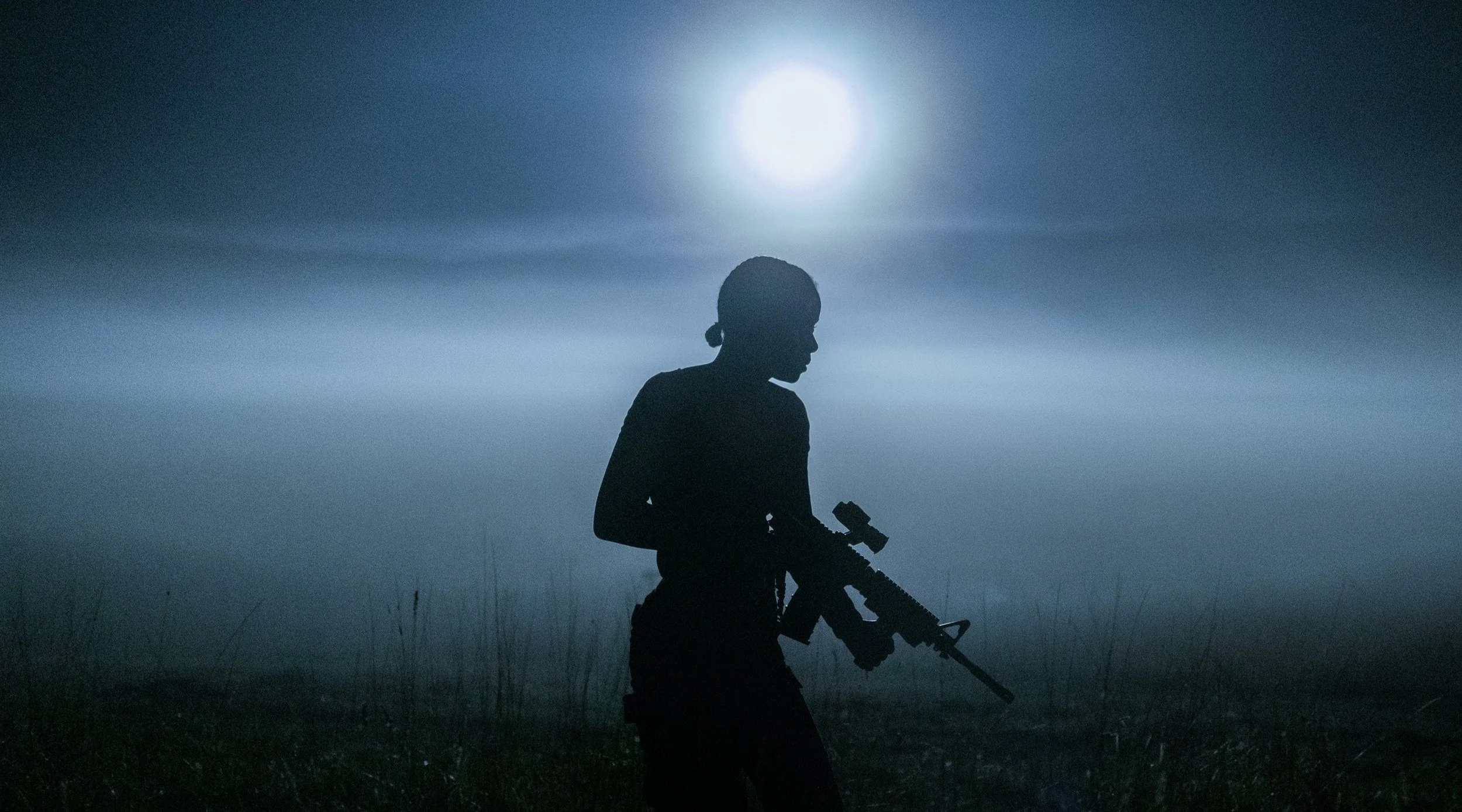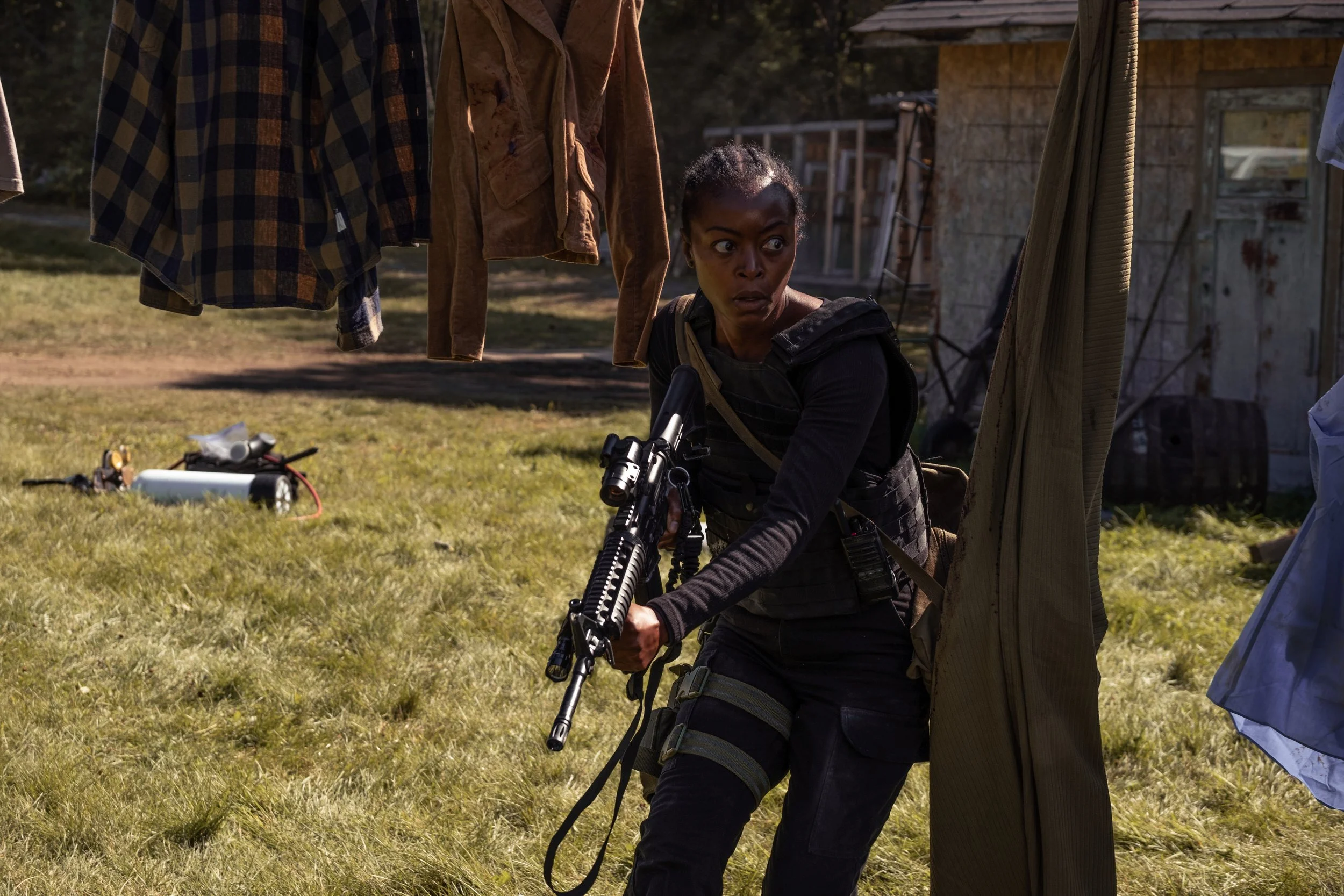‘40 Acres’ Review: R.T. Thorne Reinvigorates Canadian Genre Cinema
With a towering performance from Danielle Deadwyler and an assured sense of style, R.T. Thorne breathes new life into Canadian genre cinema with the thrillingly tactile 40 Acres and ensures a future for this artform.
It’s been a while since I’ve seen a Canadian genre film of note, and it’s crazy to say this, because the industry has churned out some severely underseen motion pictures in recent memory, including Ariane Louis-Seize’s Humanist Vampire Seeking Consenting Suicidal Person and Benjamin Brewer’s Arcadian. Yet, none of these films hold a candle to R.T. Thorne’s incredible 40 Acres, a formally daring and thematically powerful actioner that immediately impresses with technically proficient action sequences but cuts much deeper in its rumination on the desolate (in)humanity of a post-apocalyptic world its protagonists live in.
Thorne, in his feature directorial debut, visualizes a rural Canada set 14 years after a fungal pandemic decimated 98% of the animal biosphere and, as a result, led to a Civil War over a global food chain collapse. Because the planet is now ravaged by famine, farmland is now the most valuable resource, and it’s at that point where we meet the Freemans, as they defend their farm from a group of scavengers who want to take it over. The mother, Hailey (Danielle Deadwyler), does not trust anyone from the outside world, and has been training her children, Emanuel (Katem O’Connor) and Danis (Jaeda LeBlanc) how to survive in this hellscape, alongside Galen (Michael Greyeyes) and his daughter Raine (Leenah Robinson).
Of course, and predictably so, Emanuel is fascinated by what’s outside their farm, and, on a patrol day, ventures outside his fence and meets a girl named Dawn (Milcania Diaz-Rojas). She lives in a colony that seems more advanced than the fortress Hailey set up for her family, and Emanuel believes they can help each other out against the malevolent forces that not only want to take over their farm but consume things that humans shouldn’t put in their body. When Dawn is ultimately endangered, Emanuel brings her to their farm, without the expressed knowledge of Hailey or Galen, thus endangering the safety of their location.
This obviously leads to a militia group planning an attack on two farms, one ran by Hailey, and the other, by Augusta Taylor (Elizabeth Saunders), who has been communicating with several farmers via radio, encouraging them to stay locked down and not speak with anyone coming from outside. The first half, a more patient and contemplative affair, sits with the characters as they ponder how bleak this world has got, from tense dinner table conversations to potent flashbacks that reveal how Hailey has “toughened up” in an environment where everyone has been left behind.
What Thorne lays forward in this section is what genre cinema should always strive to achieve, not only in delivering pure, shell-shocking thrills (more on that later), but in making the audience think about their place on the planet inside a setting that has left humanity to fend for themselves. Obvious parallels may be made to the COVID pandemic, but Thorne’s vision of a post-apocalyptic Canada is decidedly his own and the only form of joy one can attain during such a difficult time I the close-knit bond a person can form with their family, as they aren’t ready to leave this planet behind, even if the environment wiped out their chances of survival.
All hope is lost, but the presence of Dawn, for Emanuel, gives him optimism on a brighter future, if his mother understands that not all people from the outside world are bad. However, she is proven right when their farm is under attack, and they are forced to defend it from a horde of flesh-eating cannibals, who want more than their valuable resources. It’s at that point where Thorne shifts gears and delivers a no-holds-barred actioner, through a succession of tactile gun (and knife) fights so exhilarating it genuinely gave me hope that genre artists in this country aren’t all gone (unlike what Amir Belkaim and Félix Brassard illustrated in their 2019 documentary L’inquiétante absence).
Cinematographer Jeremy Benning gives a potent, harsh visual language that immediately sucks us into this colorless environment, devoid of any real texture (complimentary), and keeps the camera steadily flowing during moments of intense action, brilliantly cut together by editors Dev Singh and Sandy Pereira. There’s a specific moment, no spoilers, that’s so unbelievable it genuinely made me wonder why Canada isn’t spending more money on pictures that not only showcase its visual identity but is in full demonstration of how our artists perceive genre works in this country. We have a continuously creative, thoughtful picture that will hopefully not go by unnoticed, as it formally breathes new life into the realm of post-apocalyptic cinema, while solidifying Danielle Deadwyler’s talent as one of the decade’s best actresses.
If you weren’t already convinced by the towering work she did in Chinonye Chukwu’s Till, Malcolm Washington’s The Piano Lesson or Jaume Collet-Serra’s The Woman in the Yard, Deadwyler will hold your breath in absolute awe during the entirety of her screentime in 40 Acres. How she can command the camera to respond to a face that has seen the worst in humanity and still hasn’t recovered from her trauma will honestly blow you away so much that you may think she is the greatest working actor. No one can modulate emotions the way she does, especially during its devastating final shot, where her pessimistic nature begins to dwindle as the dawn of a new day begins, with a glimmer of hope for what’s to come.
It won’t be easy – Hailey recognizes this. But perhaps this community will live beyond the planet’s expiration date. For her, that seems more than enough to fight for its survival and plant the seeds for a brighter future that generations yet to come can prosper in. As far as I’m concerned, this cogency in its sociopolitical commentary gives 40 Acres an edge that few genre pictures made in Canada (and abroad) have and reinvigorates interest in a type of filmmaking that shouldn’t be dismissed but encouraged. Will this pave the way for more genre artists to flex their muscles on the big screen? Here’s hoping.
Not only does this film showcase the importance of genre cinema in this country, but our most successful filmmaker, Denis Villeneuve, who started his career in Montréal through independent filmmaling, is now given the keys to the most popular action movie franchise in history. R.T. Thorne seems poised to become one of our foremost genre artists with a film like 40 Acres, and by working with Danielle Deadwyler, he’s ensured the film will have a perennity as more audiences discover the world of Canadian cinema and see how it genuinely sets itself apart from the rest of the pack...



